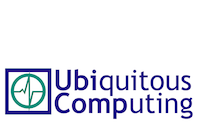Ubiquitous Computing -- Lecture -- SS2017
This lecture will give an overview on relevant concepts and
technologies (such as the history of ubiquitous computing and
underlying visions, embedded systems and cyber-physical
systems, mobile computing, wearable computing, and wireless
sensor networks). It will also deal with more specific subjects
(e.g., context awareness, activity recognition, privacy and
security issues, research methods in this emerging field). Case
studies will also be given during breaks to give more insights
in current developments and the lessons and pitfalls that
researchers and engineers have met while deploying such novel
systems.
Description:
Size: 2 hrs lecture + 2 hrs exercises (5LP)
Lecture: Thu. 12:15-14:00 Uhr in room US-A 016
Exercises: Thu. 14:15-16:00 Uhr in room US-A 016
Type of exam: Oral
Lecturer(s): Kristof Van
Laerhoven
LSF links: Lecture:
43UCO1111V, Exercises:
43UCO1112V
Overview of the Lecture:
1. Introduction to Ubiquitous Computing
Organisation, Basics, Vision of Ubiquitous Computing
2. Wearable Computing, Nomadic Technology
History of Wearable Computing, Wearable Input/Output,
Intelligence Augmentation
Designing for wearable use and wearable experiment
designs, security and privacy
3. Wireless Sensor/Actuator Networks, Smart Dust
WSN basics, background technologies, applications
WSN operating concepts, Events and threads, MAC
protocols, Contiki
4. Physical Interaction, Tangible Interfaces
Human physiology, predictive/descriptive models for
interaction
Tabletop computing, Tangible user interfaces
5. Context Awareness, Detecting Activity, Location
Context Awareness, Recognition of activities,
Features,
classifiers, evaluation, Location Awareness, Fusion
Approaches
6. Critical Systems Design, Security & Privacy
First examples, Privacy definitions and history
Cryptography basics, Critical systems design
7. Designing Experiments for UbiComp
Experiments, study design and study types
Statistics, new methodologies
Exercise Material:
2. Wearable Computing
Introduction to Processing and basic visualization
routines
Design choices in visualization
Slides from the previous semester:
ZIP-file
